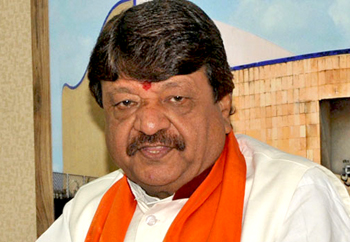Bhopal, Jul 14: Senior Bhartiya Janta Party leader Kailash Vijayvargiya has termed the Vyapam scam as a "small incident" and said that the party's morale is not down on the issue.

He and the national vice president in charge of MP, Vinay Sahasrabuddhe were addressing the media on the sidelines of the review meeting of the Mahasampark Abhiyan (mass contact drive). The meeting was addressed by BJP president Amit Shah and witnessed participation of top BJP leaders of MP and Chattisgarh.
When asked if the BJP was planning to start a yatra to put its point of view in the Vyapam controversy and to address morale of workers, Kailash Vijayvargiya said that the morale of the workers was high.
“Those whose morale is low should worry. The BJP has no such problem,” he said.
In reply to another question if the Vyapam controversy was discussed during the meeting, Kailash Vijayvargiya said that the meeting’s sole agenda was Mahasampark Abhiyan.
He sought to brush aside any reference to the Vyapam controversy and said that party president Amit Shah had appreciated the work done by the CM of Madhya Pradesh and Chattisgarh both.
Vijayvargiya had recently triggered a row after the death of TV journalist Akshay Singh, who was investigating the unnatural deaths in the scam, by reportedly saying, "Is a journalist bigger than me?". He later denied making such a statement.
Meanwhile, Congress workers staged a protest over the Vyapam scam near the venue but the police prevented them from reaching Samanvay Bhawan where the BJP meeting was held.






Comments
Add new comment